An essential part of a modern U.S. household is an air-conditioning system. And with growing concerns for energy conservation, homeowners are looking for answers if a central air-conditioning system or a window AC unit is the energy-efficient choice for their homes. We did the research for you and here's what we found.
The answer depends if your aim is to provide cooling for your entire home or just a single room. If you want to provide cooling for the whole house, one appropriately-sized central AC system will use lesser energy than having multiple window AC systems in each room. You may opt for a window AC, however, if you just need to provide cooling for one or two rooms inside your home.
In this article, we'll discuss factors that can make your AC system cost-efficient and energy-efficient. If you want to learn more about this, keep reading.
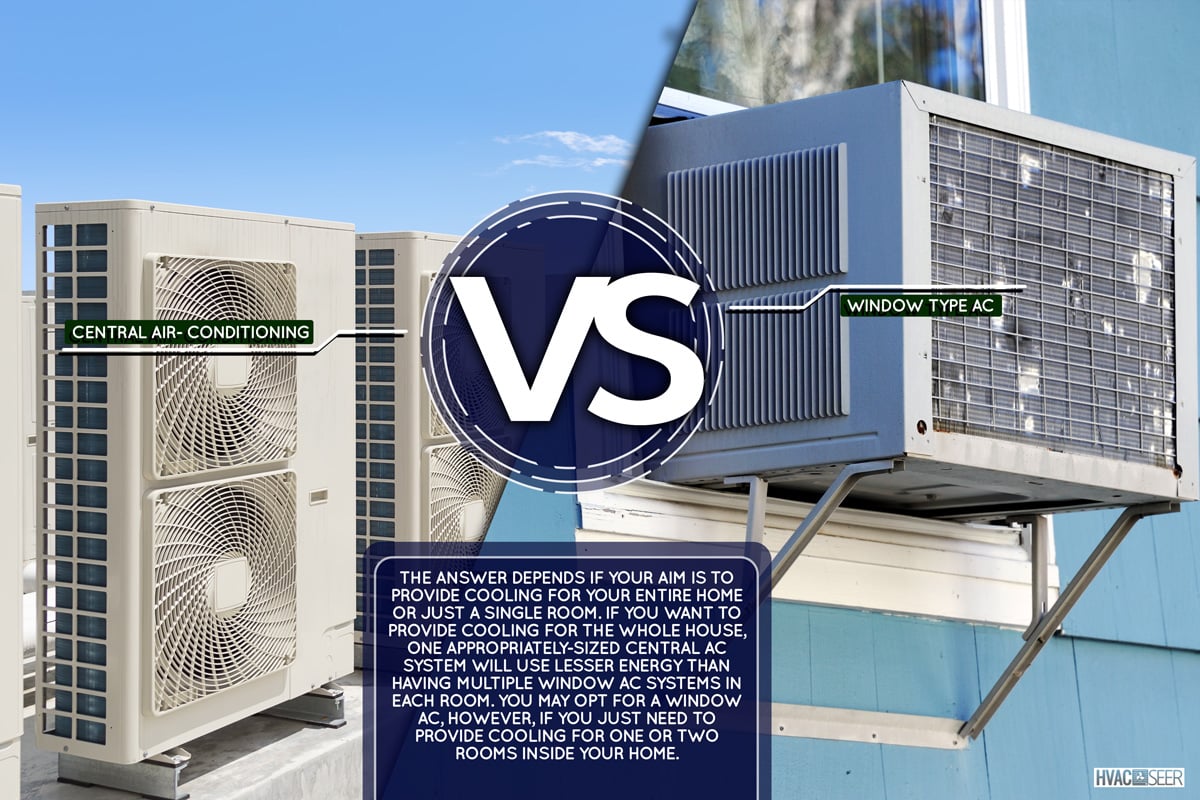
Factors To Consider When Choosing Between Central AC Systems and Window AC Systems
Energy efficiency and conservation do not necessarily mean you have to favor just one type of AC system over another for your household cooling system. Several factors must be considered when picking between central and window air-conditioning units. These are energy usage, cost of installation, as well as convenience, comfort, and value.
Energy Usage
A window AC unit only uses anywhere from 500-1440 watts of energy, and a central air unit for an average-sized household can use about 3500 watts. Central air systems flow through the house through ducts with a furnace blower, using more parts to run and adding a bigger power draw. While a window unit uses relatively lesser energy.
Window units are cost-efficient and energy-efficient at the same time if your goal is to cool just one room at a time, as opposed to a central air system that runs throughout the house, requiring more electricity to use. However, if the goal is to cool an entire household, more than one window AC unit is needed to do this.
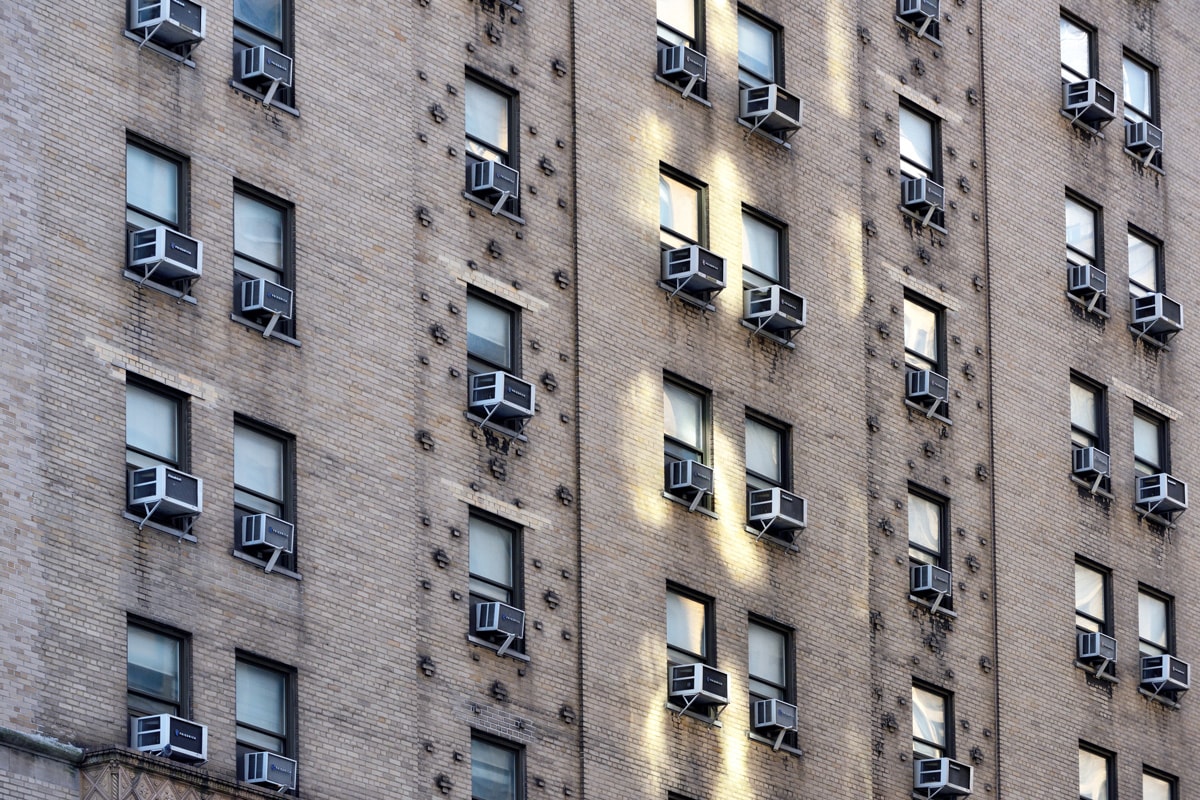
The figures alone do not automatically mean that window AC saves you more energy because you still have to multiply the wattage by the exact amount of window AC units you have in your home. While a central air unit is fixed at just one per household. It depends on your aim and preference.
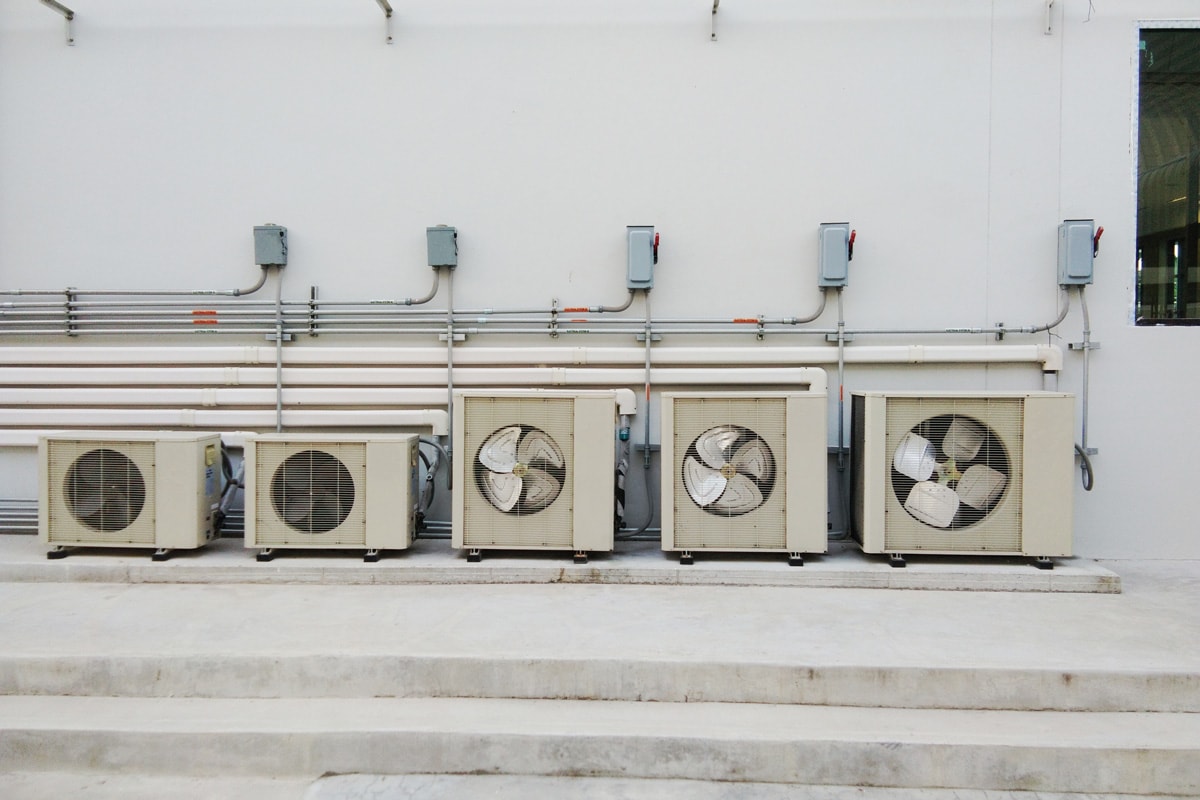
Central air conditioners are preferred if the purpose is to cool an entire household. Although they consume a lot of power, only one is needed to evenly distribute cool air throughout your house instead of using multiple window units, which only cool a limited number of rooms.
Cost of Installation
Window AC units are much cheaper to install than central AC units because they are smaller and take relatively less time to install, and you can do the installation yourself.
Window AC units are inexpensive, and average installation costs range from $350 to $1,150 for professional installation. But you can do it yourself if you want to save costs.
On the other hand, installing a central air system is more expensive. Central air units cost an average of $5,000-$12,000, depending on the size, and you need to have them professionally installed, unlike window AC units. Smaller central air units cost less than bigger, upgraded systems.
The actual costs depend entirely on the size of the unit. But the gist goes: the bigger the unit, the higher the costs.
Convenience, Comfort, and Value
For window units, cooling is limited to one to two rooms inside your home. You will even need more than one window unit to cool the whole house. There is also little control over the temperature setting, requiring manual adjustment.
Central AC units can have programmable thermostats that allow you to easily set the varying temperature you need every hour of the day. They are efficient because they can be consistent with temperature, and you only need to control one central system for the entire house.
When it comes to temperature control and efficiency, central AC units are more convenient and comfortable for home use compared to window air conditioning units.
As to value, a central AC unit is a good investment as it adds to your home's resale value. In the real estate market, homes with central air systems have an increased value, and most home buyers consider them a good deal and will pay extra for them.
How To Reduce Electric Consumption With AC Units
Whether you opt for a central air conditioning unit or a window unit, it is no secret that both are a valuable addition to your home and increase the comfort level in your space. However, one age-old question for homeowners is finding effective ways to reduce electric consumption.
The more you use your AC, the higher your electric bill will rise.
AC units, unlike other home appliances, consume more electricity. One reason is that average homeowners use AC for longer hours in the day, especially when they prefer indoors over humid, hot outdoors.
If you want to cut costs on your electric bill, you obviously need to learn these tips and tricks to reduce power consumption:
Turn up the thermostat to one degree higher
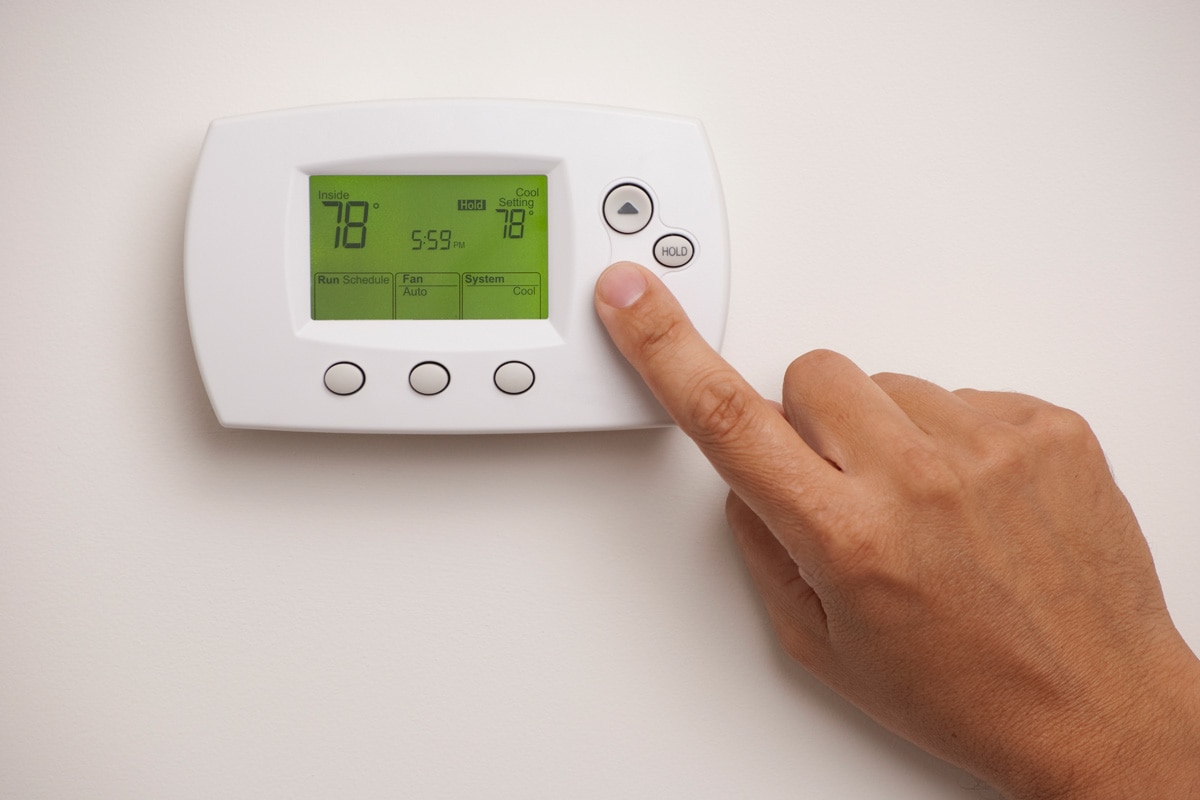
It may sound odd that the first tip to reduce power consumption involves turning up the thermostat to one degree higher. For example, you usually set your thermostat at 71 degrees Fahrenheit. Setting it one degree higher, or at 72 degrees, can help you save on power consumption. This one is easy since most people can't tell the difference between small shifts in temperature.
You reduce your unit's workload with an increased temperature setting, and a lesser workload means lower power consumption. Just don't turn it up too high on hot summer days to the point that your indoor temperature is the same as outdoors.
If you don't feel confident just eyeballing the desired temperature setting inside your home, you can opt for a smart thermostat to program a more consistent temperature setting. Consistent indoor temperature requires lesser electric consumption.
Check out this smart thermostat on Amazon.
Keep AC ducts and vents clean
Dirty vents and blocked airflow cause your air conditioner to use more power as it needs to work harder to pump cool air inside your home. This results in your appliance consuming more energy than it typically would when it is clean.
If your filter is filled with dust, it becomes a barrier to the airflow and results in a low airflow rate, causing your AC unit to work harder to pump air efficiently.
Keeping your AC ducts and vents clean keeps your unit running efficiently. This goes a long way since you will not need to spend so much on maintenance. If you want to learn more about this, check out our article: How To Clean Central Air Conditioner Vents And Ducts
Always clean your air filters regularly and change them if needed
Just like AC ducts and vents, air filters affect the performance of your AC unit. Air filters that are dirty can reduce airflow and cause your appliance to work twice as hard just to push air out, thus, causing a spike in power consumption.
Accumulated dust particles slow your AC down, and a slow-functioning unit takes longer time to cool your space. You want to clean the filters at least once a month to keep dust particles from accumulating and ensure a smoother airflow. It is recommended to have your air filters changed every month, depending on the brand and model.
Remember that if there is no blockade in the air filters, your AC can function more efficiently and consume less power.
Check out this AC filter on Amazon.
Schedule regular maintenance
Regular maintenance ensures the efficient operation of your AC and helps prolong its lifespan. While your own routine cleaning and maintenance suffice to do the job, it is advisable to avail of professional air conditioner maintenance services every once in a while.
Routine cleaning and maintenance done by professional air conditioner technicians are necessary for your unit to effectively and efficiently function. If you lack the essential maintenance that your appliance needs, it will eventually result in a performance decline and higher energy consumption.
Is It OK For AC To Run Continuously?
Yes. An AC unit's purpose is to maintain indoor temperature all day long so you can run it continuously 24/7. But if you don't want to overwhelm your unit, you can set limits to its running hours.
Does Turning AC On And Off Cost More?
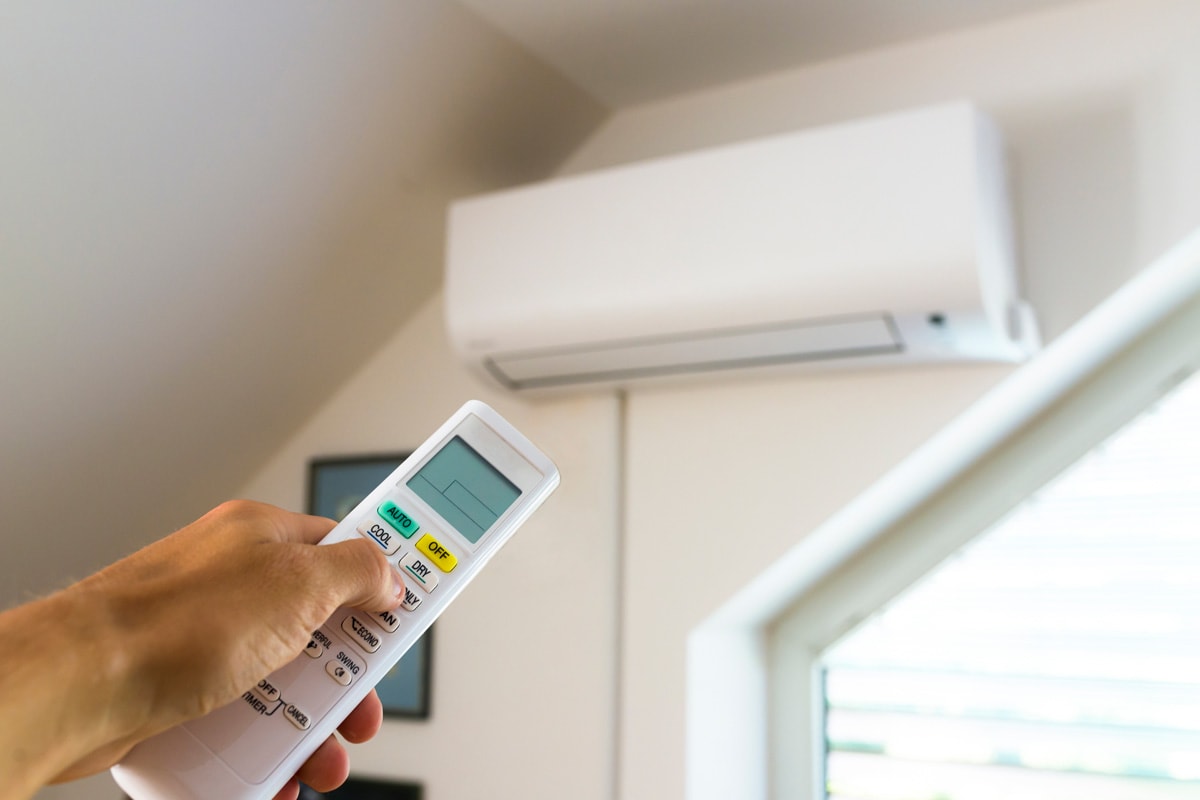
The answer depends on your situation. If you're leaving the house for an extended period, turning your AC off can save you energy expenses. This is not the case if you're just leaving for work and your AC is turned off, especially on humid days, because the air-conditioning unit will have to work harder to cool down and remove the humidity once it's turned on.
You don't have to sacrifice your comfort, however, by risking high humidity indoors. You can turn the temperature up one degree higher when you leave the house and adjust it when you get home. Every degree higher that the thermostat is raised, your AC uses energy for 3 to 5 percent less.
In Closing
A central air-conditioning system is an efficient choice if you aim to provide cooling for the whole house. While a window air-conditioning system is a good option if you just need to provide cooling for a limited number of rooms inside a house.
Ultimately, choosing between central air and window AC systems for your home totally boils down to your preference. Both systems provide different advantages and specifications that can suit a homeowner's specific home needs.


